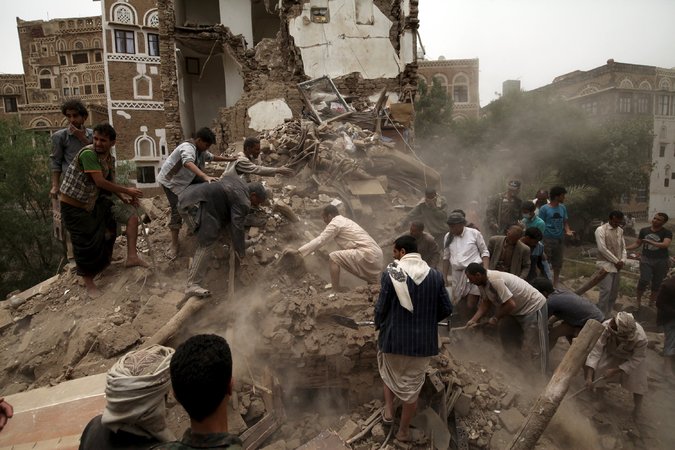By Martin Berger
For months Saudi Arabia has been attempting to shell and bomb Yemen back to the stone age over the course of its illegal military aggression against the Yemeni population. The Saudi intervention was launched back in 2015 under the pretext of restoring the rule of Yemeni President Abd Rabbuh Mansur Hadi. Back then, Riyadh reached an agreement with Washington that it would be allowed to form an anti-terrorist coalition, but instead of targeting ISIS or al-Qaeda, their forces have been fighting the resistance movement led by the Houthis, claiming that the atrocities that are being committed over the course of the fighting are aimed at reducing Iran’s influence in the region.
The strategy that Saudi Arabia chose at the start of its intervention closely replicates those that Washington used in Afghanistan, where ground troops captured only key hubs, while the rest of the country was bombed by warplanes in an attempt to suppress any resistance. Saudi authorities are taking advantage of the fact that Yemen is the poorest country of the Arab World, and a country that possesses no antiaircraft capabilities.
This war, according to UN estimates, has already led to the largest humanitarian crisis on Earth, with a total of 21 million Yemenis in need of urgent humanitarian assistance, and with 7.5 million being on the verge of painful death due to the absence of food and drinking water. According to Reuters, at least 10,000 people have been killed in Yemen’s 18-month-old war, with over 3,500 civilians falling victims to airstrikes carried out by the Saudi-led coalition. Moreover, some 30,000 civilians have been injured over the course of these attacks, and a total of 2.8 million people forced to leave their homes. While the majority of the hospitals have been destroyed or forced to stop operating, the humanitarian situation in Yemen is deteriorating rapidly. The UN Humanitarian Coordinator Jamie McGoldrick has already announced that the death toll may be much higher, since in the absence of medical facilities, numerous deaths go unreported and unregistered all across Yemen.
The report drafted by the UN Refugee Agency states that Saudi Arabia has been repeatedly violating human rights and international laws during its military campaign. The list of Riyadh’s crimes is long and depressing, since it includes such criminal acts as shelling of residential areas, markets, medical and educational institutions, the use of landmines and cluster bombs, the use of sniper attacks in residential areas, restrictions of freedoms, and the enlistment of minors. This UN agency is convinced that the international community has a moral obligation to take immediate steps to ease the resulting, appalling human suffering.
On August 15, Saudi aircraft destroyed yet another hospital run by the Doctors without Borders, killing 11 and leaving at least 19 more injured. In response, the UN Secretary General Ban Ki-moon stressed the fact that Saudi Arabia has been routinely attacking hospital in Yemen, including a hospital in the Sa’ada Governorate and a mobile medical center in the Taiz Governorate.
On January 8, Human Rights Watch reported that Saudi warplanes began dropping cluster bombs on residential areas of the Yemeni capital – Sana’a. The director of this organization, Steve Goose, stressed the fact that the repeated use of cluster bombs in densely populated areas leads one to the assumption that Riyadh is targeting civilians intentionally, which constitutes a war crime.
Despite the fact that Washington has been selling weapons to Saudi Arabia before and throughout the conflict, Riyadh seems to be unable to score a decisive victory in Yemen. In turn, well-prepared and highly mobile armed units of the Houthis have been counterattacking successfully and have even launched a number of missiles into the territory of Saudi Arabia. It’s been noted time and time again that Yemenis are natural born fighters and Saudis can in no way compete with them on the battlefield. Moreover, the military wing of Ansar Allah has been gradually bringing the fighting into southern Saudi territory. In addition, the military operation is costing Saudi Arabia tens of millions of dollars a day, a problem considering the kingdom’s budget was running thin even before Saudi Arabia launched its military campaign.
This war cannot be won by military means. Yemen now faces disintegration, while Al-Qaeda in the Arabian Peninsula is gradually expanding its influence over territories not controlled by any of the parties of this bloody war. Soon we’ll witness yet another Syria in Yemen.
Therefore, one thing is clear: there can be no major political decision made in Yemen without the Houthis, and Saudi Arabia must start negotiations with them sooner or later. As for the international institutions and human rights organizations, they must become actively involved in the search for a peaceful solution of the Yemeni conflict by all mean possible to prevent the further destabilization of Yemen and the suffering of its people.
Martin Berger is a freelance journalist and geopolitical analyst




















